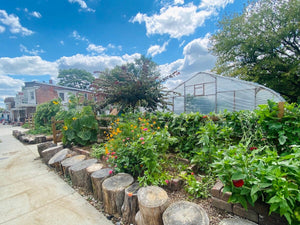5 Powerful Plants That Repel Bugs (Grow These Natural Pest Fighters!)
The world is full of bugs. Some are beneficial, but some are destructive. Instead of reaching for chemical sprays, consider a natural solution—plants! Many herbs and flowers have natural pest-repelling properties that can help keep mosquitoes, flies, beetles, and other unwanted bugs at bay. Take a look at these top five plants you can grow that will help keep bugs away from your home and garden.

How do plants repel bugs?
The most basic way plants repel pests is with their scent. Insects and other pests use their highly developed sense of smell to find food. Some plants have a scent that these bugs want to avoid. The scents can also help to mask the smells of food sources that the insects are looking for. That’s why companion planting can be helpful in vegetable gardens. In other situations, the plant oils can be extracted and used in fragrant sprays that confuse the insects. These essential oils don’t kill bugs but rather keep them away.

The Ancient Use of Plant Oils for Pest Control
For thousands of years, natural oils and plant scents have been used to repel bugs. The Egyptians burned herbs like lavender and mint to keep flies and mosquitoes away, while the Greeks and Romans used aromatic plants such as rosemary and thyme in their homes and temples.
Today, even with the wide array of chemicals that can be used to repel bugs, the use of natural plants is still popular with many gardeners. Having an organic home and garden is possible when you know what plants are natural bug repellents.
While many people are familiar with citronella as a mosquito deterrent, there are plenty of other plants that go beyond just repelling mosquitoes. If you're looking for mosquito-specific solutions, check out our blog post: Beyond Citronella: 10 Herb Plants To Repel Mosquitoes and Save Your Summer! But if you want to deter a wide range of bugs, keep reading!
In this guide, we’ll explore five powerful plants that repel bugs and how you can easily grow them from seed. Whether you want to create a bug-free patio or protect your vegetable garden, these plants can be part of an effective and eco-friendly solution.
(Want to start your own pest-deterrent garden? Check out our Pest Deterrent Seed Collection and grow your own natural bug repellent!)
The Best Plants That Repel Bugs Naturally

1. Catnip (Nepeta cataria)
Catnip is known for its effect on cats. They love to rub around on it in the garden, and they may be on to something. The benefits of catnip go beyond making your cat happy. The active compounds in catnip have been studied and shown to be effective in repelling pests.
-
How to Grow:
Prefers full sun and well-draining soil.
Start from seed indoors or sow directly in spring.
Can become invasive, so plant catnip in containers if needed. (Learn more: How to Grow Catnip)

2. Hyssop (Hyssopus officinalis)
Hyssop is an ancient herb with a history of effective medicinal uses. Its distinct aroma and flavor are valued in many culinary recipes, tinctures, and teas. Hyssop's strong aromatic smell is described as minty or sweet. It can be effective at keeping away cabbage moths and flea beetles. The flowers have a more delicate flavor than the leaves, which tend to be slightly bitter. Plant hyssop near cabbage, kale, and other brassicas to keep pests away.
-
How to Grow:
Tolerates partial shade but thrives in full sun.
Prefers well-draining soil and is drought-resistant.
Sow seeds directly in spring or start indoors for early blooms. (Learn more: How to Grow Hyssop)

3. Lavender (Lavandula spp.)
Lavender is a relaxing scent for many people but a fragrant deterrent for fleas, mosquitoes, moths, ticks, and flies. It has been used in seat cushions and closets for centuries to repel bugs. The Egyptians may not have known exactly why it was effective, but studies have shown that linalool, a component of lavender, repels flies. Mature lavender plants can also deter deer and rabbits.
-
How to Grow:
Prefers full sun and well-draining soil.
Start from seed indoors or sow in well-prepared outdoor beds.
Once established, it’s drought-tolerant and low-maintenance. (Learn more: How to Grow Lavender)

4. Lemongrass (Cymbopogon citratus)
Lemongrass is known for its distinct flavor, which is delicious in soups and teas. However, houseflies and cockroaches don’t like it. Essential oil from lemongrass is used in sprays for natural bug protection. Lemongrass is an excellent container plant and can be part of your culinary herb garden. It is also a beautiful ornamental grass.
-
How to Grow:
Prefers warm climates and full sun.
Start from seed indoors in colder regions.
Thrives in well-draining soil and benefits from regular trimming. (Learn more: How to Grow Lemongrass)

5. Marigolds (Tagetes spp.)
Marigolds are a celebrated flower in many cultures. They are easy to grow and will continuously bloom until winter frost. Marigolds are well-known for their strong scent, which is often cited as a natural pest deterrent for cucumber beetles. They also attract pollinators and other beneficial insects that help maintain garden balance.
-
How to Grow:
Easy to grow from seed and thrives in full sun.
Prefers well-draining soil and requires minimal care.
Sow directly in the garden after the last frost. (Learn more: How to Grow Marigolds)

Grow Your Own Bug-Repelling Garden!
These five plants have the potential to provide a natural, chemical-free way to keep bugs out of your home and garden. Whether you use them in companion planting, homemade sprays, or essential oil extractions, they offer a natural and beautiful pest control solution.
Remember, a thriving garden is a balanced ecosystem. By embracing these plants, you're not only adding beauty and fragrance but also potentially harnessing nature's pest-deterrent strategies. We encourage you to observe, experiment, and discover the unique benefits these historical helpers can bring to your own green space. While we can't promise miraculous pest eradication, we can guarantee the joy of cultivating a beautiful and potentially more resilient garden.
(Ready to start your own pest-free garden? Get the Pest Deterrent Seed Collection today and grow your own natural bug repellent!)
Popular Posts
-

Community Gardens: How they benefit the community and how to join in
-

Top 15 Vegetables to Grow for Food Pantry Donations






Leave a comment